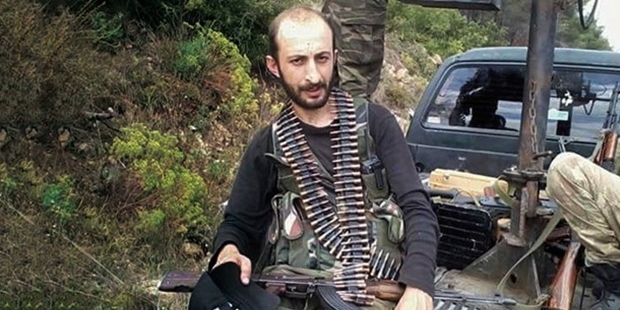Abdullah Bozkurt/Stockholm
A leaked audio recording on YouTube confirmed that Turkish nationalist/Islamist militant Alparslan Çelik, the alleged killer of one of the pilots of a downed Russian SU-24 jet in Syria in 2015, had worked closely with Turkish intelligence and the police force while enjoying political and legal protections from legal woes.
The recording, which captured a conversation between Çelik and Ilgın Şentürk, a close acquaintance, reveals how the Turkish government used jihadist militants like Çelik to fuel the Syrian civil war and protected him from legal troubles back in Turkey when he was on the run from the law.
In the phone conversation that appeared to have been recorded recently, Çelik admitted that he had organized the assault on the downed Russian pilot on behalf of the Turkish state and was involved in the killing of Russian combat pilot Maj. Rumyantsev Sergei Aleksandrovich. He expressed no remorse for what he had done and appeared to have accepted his imprisonment as an obligation to the Turkish state after intensified Russian pressure on the government of President Recep Tayyip Erdoğan.
Nordic Monitor previously published a report that confirmed a Turkish fighter jet pilot knew he was shooting at a Russian Sukhoi Su-24M warplane in airspace over the Turkish-Syrian border area when he was ordered to fire by the commander of the Air Force, Gen. Abidin Ünal, with the approval of the government. Hulusi Akar, the then-chief of general staff and current defense minister, personally met and congratulated the combat pilot of the F-16 fighter jet who had shot down the Russian jet.
In the recording, which was shared on YouTube by exiled journalist Ahmet Nesin, Çelik said he anticipated his arrest after the video footage that implicated him in the murder of the parachuting pilot in Syria was published in the media. He was bragging about how he had taken part in jihad in Syria and maintained cozy relations with Turkish officials.
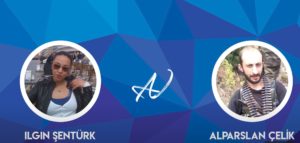
Çelik was groomed in the ülkücü (nationalist/idealist) ideology that was promoted by President Erdogan’s close ally, the racist and far-right Nationalist Movement Party (MHP). His father Ramazan was mayor of Keban for years after winning elections on the MHP ticket. In an interview with the Turkish media in 2014, his father said he was proud of his son and that he, too, was willing to go to Syria to fight if needed.
Confirming what many already believed, Çelik admitted on the phone that he was protected by prosecutors in Izmir, led by then-Chief Public Prosecutor Okan Bato and Counterterrorism and Organized Crime Bureau prosecutor Berkant Karakaya, both loyalists of President Erdogan, who hand-picked them for the job.
“My troubles could have been much worse if they had not protected me,” he added.
“[Prosecutor Karakaya] is a Turkish nationalist who protected me. I liked him very much. We sat down and chatted many times. He protected me,” Çelik said.
In fact, the original charges against Çelik for the murder of the downed Russian pilot were quickly dismissed by Karakaya, who claimed there was no evidence supporting the criminal prosecution of Çelik for the murder of the Russian pilot.
Only after pressure from Russia started mounting on the Turkish government and Moscow started revealing President Erdoğan’s family dealings with the illegal oil trafficking business from the Islamic State in Iraq and Syria (ISIS) was Çelik detained again on charges that had nothing to do with the murder of the Russian pilot.
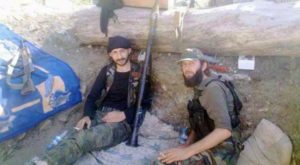
In addition to the legal cover provided by the prosecutors, Çelik and his partners-in-crime were also closely involved with intelligence, police department and ruling party officials in Izmir in running a major racketeering ring. Not only did they traffick fighters and arms to Syria but also ran organized crime activities in Izmir, threatened and blackmailed businesspeople to extort money, seize their assets and take over their businesses.
The phone conversation provided clues as to who in the Turkish government was involved in schemes to blackmail businesspeople in malicious prosecutions. Gürbüz Yüksel, the then-regional head of Turkey’s National Intelligence Organization (MIT) in Izmir; Kudret Dikmen, head of the intelligence department of the Izmir police; and prosecutors Bato and Karakaya were ringleaders running the racketeering scheme in Izmir.
According to Çelik and Şentürk, senior political figures like former Prime Minister Binali Yıldırım, former deputy chair of the ruling Justice and Development Party (AKP) Nükhet Hotar and the Turkish president’s son-in-law Berat Albayrak were part of the racketeering scheme and provided political cover for officials and militants in Izmir province.
Some of the illegal schemes run in the province were previously disclosed by Serkan Kurtuluş, Şentürk’s boyfriend and Çelik’s comrade-in-arms in Syria. Kurtuluş, who had to flee Turkey for fear of assassination after internal squabbles in the organized crime network, spilled the beans on his former accomplices from Argentina, where he was held in detention.
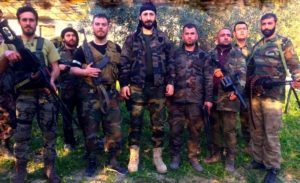
He spoke to multiple media outlets including US Fox News revealing the details of how the group seized the assets of government critics from the Gülen movement, a group that is opposed to the Erdoğan government and critical of the Turkish government’s aiding and abetting of armed jihadist groups. He also exposed a plot to kill American pastor Andrew Brunson, who was wrongfully jailed in Turkey before former US president Donald Trump intervened in securing his release and return to the US. The Erdoğan government had planned to pin the assassination on the Gülen group if Kurtuluş had gone through with the murder.
Kurtuluş was also in Syria to fight along with Çelik. In the phone recording Şentürk confirmed that her boyfriend did everything with the approval and knowledge of MIT regional director Gürbüz. Çelik claimed police intelligence chief Dikmen, described as the right-hand man of Interior Minister Süleyman Soylu, also used Kurtuluş for his own schemes.
On the phone Çelik was heard putting pressure on Şentürk to share documents about Erdoğan’s son-in-law Albayrak and former Prime Minister Yıldırım. Şentürk, who also fled Turkey, said she did not have all the documents in her possession but would send some to him later.
The criminal investigation into Çelik was initially dropped by Izmir prosecutor Karakaya after a one-and-a-half month inquiry in May 2016. Karakaya claimed that the autopsy report of the Russian pilot indicated that in addition to four gunshot wounds, he had fractures in his skull and that this could have resulted from a hit to the glass roof of the cockpit as he was ejected from the downed plane and might have led to his death. He also claimed that the video footage showed that Çelik was instructing his men to not shoot but rather take the pilot hostage, although he later admitted that he ordered them to fire and was responsible for the behavior of his men as their commander.
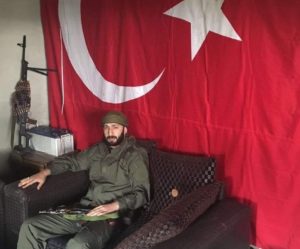
The prosecutor’s reasoning contradicted the video recordings that showed the moments Çelik and his men were shooting at the parachuting pilots. In a comment to the Turkish press right after the incident, he admitted he and his men took shots at the pilots and that they were killed in the air. He said he had already warned Russia and other sponsors of the Bashar al-Assad regime with consequences, adding that the incident was proof that he and his militia were determined to go through with their threats against Russian and Syrian government forces.
Prosecutor Karakaya, a friend of Çelik, thought he had saved his buddy from legal troubles by dropping the probe. This was not the first time Çelik had managed to remain free of legal troubles. Turkish authorities knew Çelik was a criminal and did not do anything. Before going to Syria, he was convicted on counterfeit money charges and sentenced to two-and-a-half years in prison. He escaped the prison in Niğde province. A separate investigation was pursued against him on charges of fraud and aiding in the escape of a convict.
Although he was a convicted felon and a fugitive, Çelik was freely traveling in Turkey, moving back and forth over the Turkish-Syrian border. In January 2016 he was photographed attending the funeral service of İbrahim Küçük, deputy chairman of the MHP Fatih district who was killed in Syria during clashes. He and his men were revered by the top MHP officials — deputy chairmen of the MHP Celal Adan, Atilla Kaya, Semih Yalçın and İzzet Ulvi – who are now working closely with Erdoğan in running the government in Turkey.
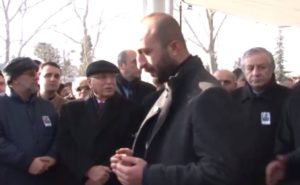
He even gave an interview to the Hürriyet daily the same month, bragging about his fight in Syria against the Russians and asking for more sophisticated weapons such as anti-aircraft artillery for the fight. He said he had no fear of the Russians.
However, as the Russian government’s pressure started to build on the Erdoğan government to do something about Çelik and the revelation of the ISIS oil schemes that involved Erdoğan’s family, things changed for Çelik.
He was detained by the police on an anonymous tip on March 31, 2016 along with his men — İsmail Demir, Mustafa Develi, Asil Tırnova, Fatih Arnas, Bayram Karaarslan, Murat Gezer, Nurettin Yıldız, Çağlar Birdal, Muhammet Ercan Bilir, İrfan Yiğit, Süleyman Altıkaynak, Serkan Kurtuluş, Erdi Ekici, İrfan Dinç, Avni Varol., Yiğit D. and İbrahim Çelik — in a restaurant on charges of possessing illegal and unlicensed firearms. The detention was in response to the Russian government’s pressure on the Erdoğan government.
In June 2016 the judge ordered his release pending the conclusion of his trial on firearms violations. However, he remained in jail on separate charges.
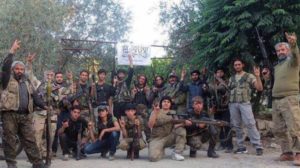
He was convicted of firearms violations in May 2017 and sentenced to five years in prison.
Karakaya adopted another tactic to help Çelik in his legal troubles stemming from the murder of the Russian pilot. In order to weaken the case, he rebranded the investigation as part of a probe into a failed coup in Turkey on July 15, 2016 and enlisted military officers in Çelik’s case. The case was classified as secret, and the Turkish authorities even expelled three Russian journalists who came to cover the trial.
Freed again from jail in December 2020, Çelik continues to serve to his masters. He defended President Erdoğan when mobster Sedat Peker, formerly Erdoğan’s ally, admitted that he sent arms to Syria in cooperation with the government and that some of the arms in his convoy were channelled to the Nusra Front. In his social media postings, Çelik tried to undermine Peker’s allegations and threatened him with consequences.

